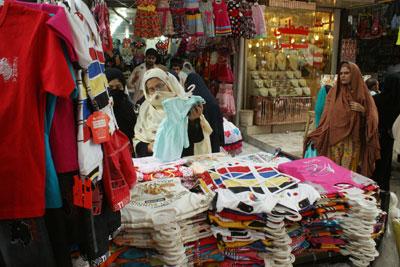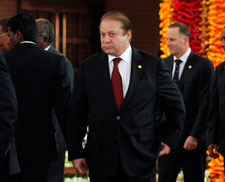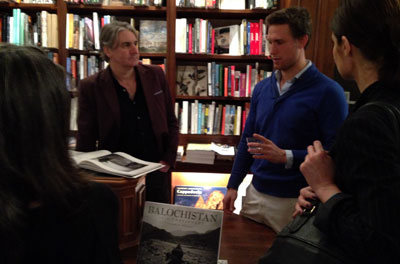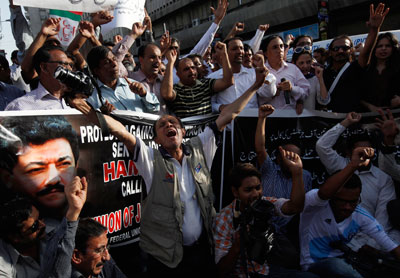
Seeking release of Pakistani journalist Faizullah Khan, jailed in Afghanistan
It’s not often that CPJ agrees with the Pakistan government, but here is one of the rare occasions when we do. While Pakistan journalists have been pushing for quite a while for the release of one of their colleagues, Faizullah Khan, being held in Nangahar in Afghanistan, the Islamabad government has apparently been working diplomatic…
A year after Snowden revelations, damage persists to freedom of expression in Pakistan
In Pakistan, where freedom of expression is largely perceived as a Western notion, the Snowden revelations have had a damaging effect. The deeply polarized narrative has become starker as the corridors of power push back on attempts to curb government surveillance. “If the citizens of the United States of America cannot have these rights, how…
When Pakistan’s largest news channel becomes the news
Today, Pakistan’s most watched news channel, Geo News, was ordered off the air and fined by the Pakistan Electronic Media Regulatory Authority (PEMRA). Earlier this week, CPJ documented an attack on Zafar Aheer, an editor of the Urdu-language Daily Jang, by six masked men–the latest in a series of attacks, threats, and acts of intimidation…
Am I a traitor?
EDITOR’S NOTE: Hamid Mir, the executive editor of Pakistan’s Geo Television, survived an April 19 assassination attempt, but was badly injured. The shooting came a few weeks after the Pakistani government pledged in a meeting with CPJ to address the insecurity plaguing the country’s journalists. Shortly after the attack, some Pakistani media stated that CPJ…
In Pakistan, no taxation without investigation
In Pakistan, reporting on the military intelligence services or insurgent groups or machinations within political parties is the normal grist for the media mill. A lot of the coverage relies on reporters with inside sources. The sources use the media as a battleground for their infighting, relying on sympathetic reporters to put forward their positions.…
Meeting commitments in Pakistan
A few days after our CPJ delegation met with Prime Minister Nawaz Sharif and secured commitments to combat threats to journalists in Pakistan, I sat down with reporters from the country’s most restive regions, who described in detail the conditions in which they work.

What should happen following the Raza Rumi attack
On March 28, gunmen sprayed the car of TV anchor and widely-respected analyst Raza Rumi, a member of the Express Group of media organizations. He escaped serious injury, but his driver, Mustafa, died. It was the fourth attack on the Express Group in eight months, with four people dead. There has been no serious police…

Blacklisted in Baluchistan
Pakistani Prime Minister Nawaz Sharif made a series of commitments to safeguard press freedom during a meeting with a CPJ delegation last week. Among them was a pledge to speak out in support of media freedom and against attacks on journalists, particularly in high-conflict areas like Baluchistan.
